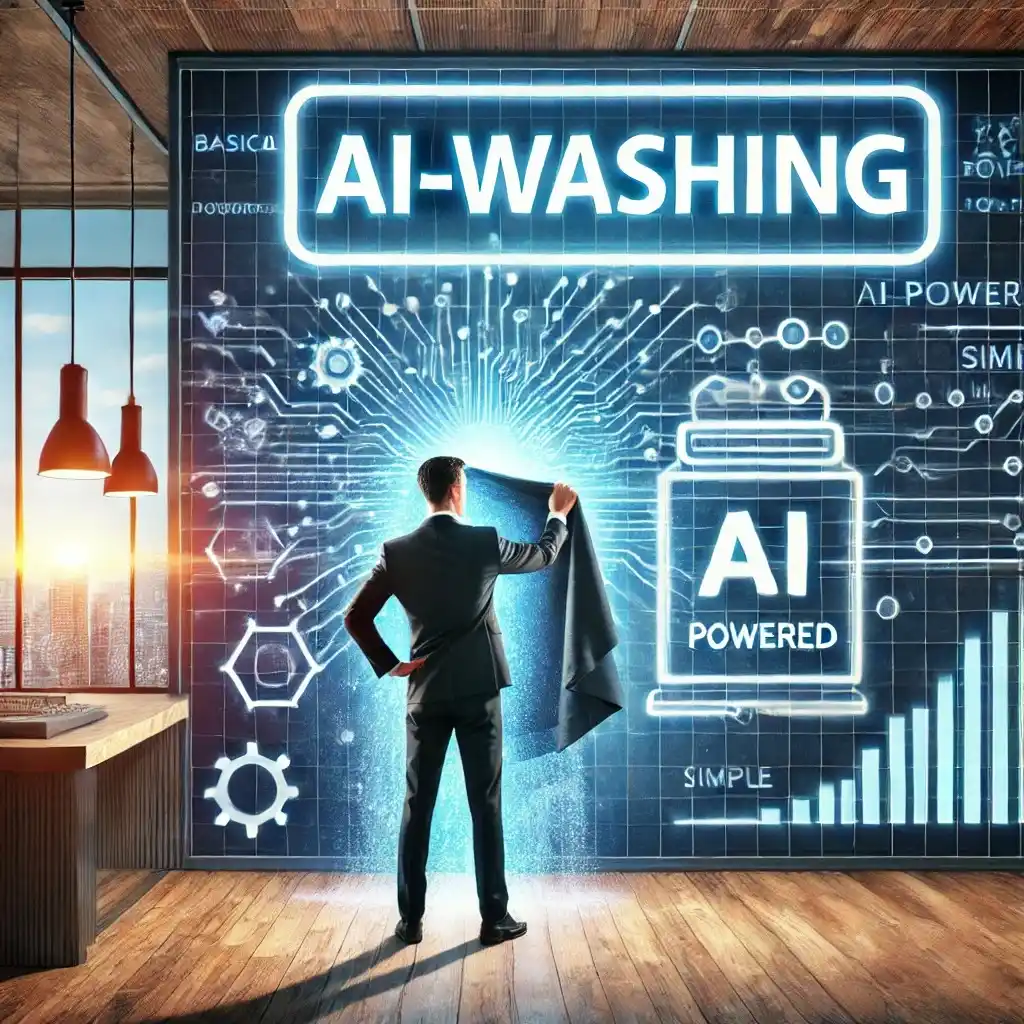
Learn & Grow
February 26, 2025 at 05:55 AM
> *AI Washing: The Dark Side of Artificial Intelligence Branding*
*Understanding AI Washing*
In recent years, Artificial Intelligence (AI) has become one of the most sought-after technologies, revolutionizing industries from healthcare to finance. With the increasing demand for AI-driven solutions, many companies are leveraging AI branding to attract investors and consumers. However, not all claims of AI integration are genuine. A growing number of companies are engaging in a deceptive practice known as AI Washing—falsely presenting their products or services as AI-powered when they either use AI minimally or not at all.
*What is AI Washing?*
AI Washing is a term popularized by the U.S. Securities and Exchange Commission (SEC) to describe the misrepresentation or exaggeration of AI capabilities in products and services. This misleading practice is akin to greenwashing, where companies falsely claim to be environmentally friendly to attract eco-conscious consumers. Similarly, AI Washing involves deceptive marketing strategies that create a false impression of technological advancement, misleading investors, customers, and stakeholders.
*Examples of AI Washing*
*Superficial Automation Labeled as AI* – Some companies rebrand traditional automation or simple rule-based algorithms as AI, even though they lack machine learning or deep learning capabilities.
*Minimal AI Involvement* – A product might use AI for a minor feature but is marketed as an entirely AI-powered solution.
*Misleading AI Claims in Startups* – Many startups exaggerate their AI capabilities to secure funding, attracting investors with promises of groundbreaking technology.
*Overhyped AI Assistants* – Some digital assistants claim to be AI-powered but function primarily on pre-programmed responses rather than real-time machine learning.
*Why AI Washing is a Problem*
*1. Consumer Deception*
AI Washing misleads consumers who purchase products under the false assumption that they leverage advanced AI technology. This leads to dissatisfaction when the promised AI-driven results are not delivered.
*2. Misleading Investors*
Investors often pour millions into companies believing they are investing in next-generation AI technology. If these claims turn out to be false, it can lead to significant financial losses and market instability.
*3. Stalling Genuine AI Innovation*
When companies exaggerate their AI capabilities, it diverts attention and funding away from genuine AI-driven innovation. This creates an environment where true AI advancements struggle to receive the recognition and investment they deserve.
*4. Erosion of Trust in AI*
False claims contribute to skepticism and distrust in AI technologies. If consumers and investors repeatedly encounter misleading claims, they may become wary of AI as a whole, hindering the adoption of legitimate AI solutions.
*How to Identify AI Washing*
To differentiate genuine AI products from those engaging in AI Washing, consider the following:
✅ *Ask for Technical Specifics* – Companies with true AI capabilities should be able to explain the underlying technology, such as machine learning models, neural networks, or natural language processing techniques.
✅ *Check for Industry Validation* – Look for third-party validations, academic collaborations, or certifications from recognized AI research organizations.
✅ *Examine Performance Claims* – Be skeptical of vague or overly ambitious AI claims that lack empirical evidence or real-world testing.
✅ *Transparency in AI Usage* – Ethical AI companies disclose how AI is used in their products and provide limitations rather than overpromising results.
*Regulatory Responses and the Future of AI Ethics*
Governments and regulatory bodies are beginning to address AI Washing. The U.S. SEC has started scrutinizing AI claims made by publicly traded companies to ensure they are not misleading investors. Similarly, the European Union's AI Act seeks to introduce regulations that promote transparency in AI claims.
Moving forward, ethical AI development and transparent marketing will be key factors in ensuring that AI remains a trusted and transformative technology. Companies must be held accountable for their claims, and consumers should be educated on how to discern real AI from deceptive branding.
*Conclusion*
AI Washing is a growing concern in the tech industry, leading to misinformation, loss of trust, and misallocation of resources. Whether you are a consumer, investor, or business leader, understanding the reality of AI technology is crucial to making informed decisions. The push for AI transparency, ethical marketing, and stronger regulations will be essential in maintaining integrity in AI-driven innovations.
*Stay informed. Demand transparency. Support genuine AI innovation.*
#aiwashing #artificialintelligence #techethics #airegulation #investorawareness #aitruth #techfraud #machinelearning #responsibleai #aiinnovation #pathfinder_careerguide #rosemaryinstitute #rosemaryfoundation #staunchinfrastructure #staunchinfotech #staunchconsultancy #superstructural
